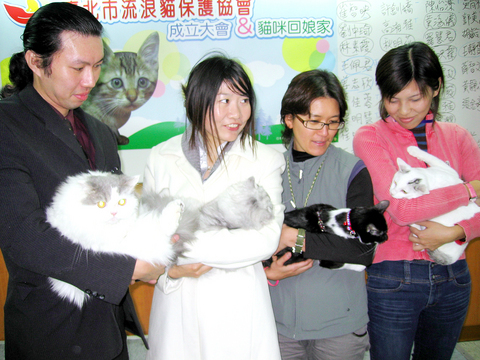Taipei's stray cats now have an association all their own which will look after their wellbeing in a metropolitan environment that can often be inhospitable.
Sara Choi, the founder of the association, told a press conference about the mistreatment she witnessed years ago that spurred her to form the group.
"I don't know how my neighbors had the heart to poison cats or get rid of kittens by tossing them off the 12th floor," the South Korean said.

PHOTO: ANGELICA OUNG, TAIPEI TIMES
Choi, who first came to Taipei from South Korea as a student, soon began to take in strays she found at the market or in the streets close to her home.
She now works for an airline company and keeps 11 cats of her own in her 109m2 apartment.
"I realized that eventually my individual powers to make a difference would be limited and that is why we formed this association" Choi said.
"Our goal is to neuter 20 cats a month and adopt at least one," she said.
Choi says that Trap, Neuter and Release (TNR) is a more humane and sensible approach to controlling the population of stray cats in the city than euthanasia.
"Human beings are the ones making the city dirty by littering. This brings in the rats, followed by the cats," Choi said.
She added that the association captures strays, neuters them and assesses whether they are suitable for adoption.
"Some cats are too wild and not suitable to be house pets, so we put them back out there after we've neutered them," she said.
"Every city needs a certain population of cats or we'll be overrun by rats," she said.
At the association's inaugural meeting yesterday, a number of cat owners who have chosen to adopt unwanted cats rather than buy them from a pet store showed off their beloved felines.
"We did not want to support the cat breeding industry in Taiwan, as many of its players do not operate in an ethical manner," said Chiu Yu-te (
The association has yet to come up with an English name.

Right-wing political scientist Laura Fernandez on Sunday won Costa Rica’s presidential election by a landslide, after promising to crack down on rising violence linked to the cocaine trade. Fernandez’s nearest rival, economist Alvaro Ramos, conceded defeat as results showed the ruling party far exceeding the threshold of 40 percent needed to avoid a runoff. With 94 percent of polling stations counted, the political heir of outgoing Costa Rican President Rodrigo Chaves had captured 48.3 percent of the vote compared with Ramos’ 33.4 percent, the Supreme Electoral Tribunal said. As soon as the first results were announced, members of Fernandez’s Sovereign People’s Party

EMERGING FIELDS: The Chinese president said that the two countries would explore cooperation in green technology, the digital economy and artificial intelligence Chinese President Xi Jinping (習近平) yesterday called for an “equal and orderly multipolar world” in the face of “unilateral bullying,” in an apparent jab at the US. Xi was speaking during talks in Beijing with Uruguayan President Yamandu Orsi, the first South American leader to visit China since US special forces captured then-Venezuelan president Nicolas Maduro last month — an operation that Beijing condemned as a violation of sovereignty. Orsi follows a slew of leaders to have visited China seeking to boost ties with the world’s second-largest economy to hedge against US President Donald Trump’s increasingly unpredictable administration. “The international situation is fraught

MORE RESPONSIBILITY: Draftees would be expected to fight alongside professional soldiers, likely requiring the transformation of some training brigades into combat units The armed forces are to start incorporating new conscripts into combined arms brigades this year to enhance combat readiness, the Executive Yuan’s latest policy report said. The new policy would affect Taiwanese men entering the military for their compulsory service, which was extended to one year under reforms by then-president Tsai Ing-wen (蔡英文) in 2022. The conscripts would be trained to operate machine guns, uncrewed aerial vehicles, anti-tank guided missile launchers and Stinger air defense systems, the report said, adding that the basic training would be lengthened to eight weeks. After basic training, conscripts would be sorted into infantry battalions that would take

GROWING AMBITIONS: The scale and tempo of the operations show that the Strait has become the core theater for China to expand its security interests, the report said Chinese military aircraft incursions around Taiwan have surged nearly 15-fold over the past five years, according to a report released yesterday by the Democratic Progressive Party’s (DPP) Department of China Affairs. Sorties in the Taiwan Strait were previously irregular, totaling 380 in 2020, but have since evolved into routine operations, the report showed. “This demonstrates that the Taiwan Strait has become both the starting point and testing ground for Beijing’s expansionist ambitions,” it said. Driven by military expansionism, China is systematically pursuing actions aimed at altering the regional “status quo,” the department said, adding that Taiwan represents the most critical link in China’s